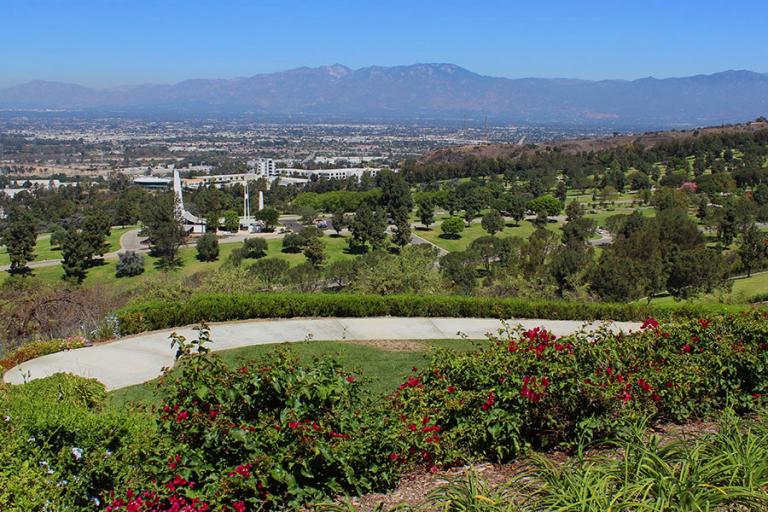
(Wikimedia Commons public domain)
Rose Hills Memorial Park, in Whittier, California, is apparently the largest cemetery in the United States. It’s also the resting place of many of my relatives, mostly on my father’s side — including my paternal grandparents, at least three uncles, an aunt, a niece, and a lot of the people that I knew growing up. And my parents are buried there, too.
My wife and I visited my parents’ graves today. The view from their burial place is wonderful, and today was a nice day. We could see the skyscrapers of downtown Los Angeles off in the distance to the west, and, to the north, the San Gabriel Mountains — including Mt. Wilson, which I saw every day of my life growing up, with its television broadcasting towers and its observatories (from which Edwin Hubble first noticed the red shift of distant galaxies, thus discovering the expansion of the universe and leading to the theory of the Big Bang). It’s a very peaceful place, and I love it. The inscriptions on their tombstones sum them up, simply but eloquently: For my Mom: “Beloved wife and mother,” and then “Family first.” For my Dad: “Beloved husband and father,” followed by “A good man.” (I once dedicated a book to him with a citation from John 1:47 in the KJV New Testament: “an Israelite indeed, in whom there is no guile.”)
And I was happy again today to see the grave next to my mother’s, on the opposite side from my father’s. Why happy? Let me explain.
My father died on 30 June 2003. My mother died on 11 April 2005. I think it was on our first visit to their cemetery after my mother’s passing that my wife and I, driving up the rather steep hill toward my parents’ graves, noticed an elderly man who was toiling painfully up the road. We pulled over and asked him whether he could use a ride. Yes, he said, he could. He was walking to put flowers on the grave of his wife, whose loss, it soon became clear, he still felt with acute pain.
We invited him to ride with us, and told him to tell us where to turn. To our astonishment, his wife’s grave turned out to be about four or five feet from my parents’ burial place. It was separated from their graves by his own tombstone, with his name, “Frenchy M. Morrell,” and his birthdate inscribed on it but, obviously, no death date. We talked for a while, and he spoke movingly about how much he missed his wife, Wanda, who had died in 1985. He was horribly lonely, and he longed to be with her again. We offered him a ride back down the hill and to wherever he wanted to go, but he had planned on spending several hours there by his wife’s grave, and he declined our offer. We never saw him again.
We’ve returned, and I’ve come back alone, many times since then. Whenever I’m in southern California, if I can do it, I visit the cemetery. Every time, I’ve looked to see whether Frenchy had finally gotten his wish.
Visiting in the spring of 2013, we immediately noticed that the grass next to my mother’s grave was fresh, and so, with some excitement, I hurriedly walked over to confirm what I suspected: Frenchy was gone. He had died on 30 August 2012.
I’m deeply happy for him. After twenty-seven long years of sorrowful separation, he’s with his wife again.
We took some of the flowers that we’d brought for my parents that day, and placed them on his grave.
“And God shall wipe away all tears from their eyes; and there shall be no more death, neither sorrow, nor crying, neither shall there be any more pain: for the former things are passed away” (Revelation 21;4).
Posted from Newport Beach, California.











